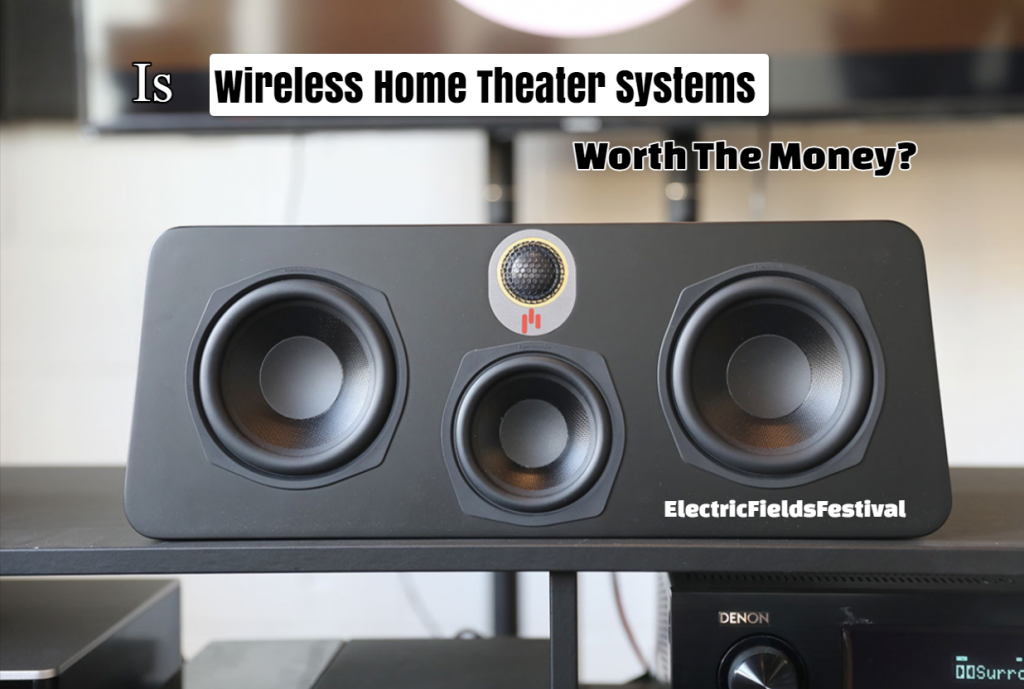Are Wireless Home Theater Systems Worth it? I’ve noticed a recent surge in popularity for wireless home theater systems, which I’ve managed to avoid for quite some time.
However, in light of our recent shift toward general wireless technology, I decided to conduct an unbiased review of wireless home theater systems.
The information in this article is intended to assist you in determining whether a wireless system is right for you. There are some obvious advantages, but it is also important to understand the disadvantages. I’ve also researched other topics, such as how to convert wired speakers to wireless speakers. Continue reading to learn more.

Best High End Home Theater Speakers (Full Guide!)
THE TRUTH ABOUT WIRELESS HOME THEATER SYSTEMS
What exactly do we mean when we talk about wireless home theater systems? Is it possible to have a home theater that is completely wireless? Technically, no, and when people talk about wireless home theaters, they usually just mean wireless speakers.
After all, when it comes to trailing wires, speaker systems are the main culprit. Wireless speakers are not a novel concept. For years, we’ve had Bluetooth and Wi-Fi portable speakers, and the technology is improving in terms of sound quality and battery life.
However, as this technology advances, a number of wireless speaker systems for use in a home theater have emerged. The idea of having a wireless surround sound system is appealing, especially if you have a large room and can’t hide the wires behind the walls.
Trailing wires can cause accidents, not to mention that they can be unsightly and detract from the overall appearance of your otherwise professional-looking home theater.
So, how do you create a wireless speaker system for your home theater? The truth is that you cannot. Yes, your satellite speakers can be wireless, but your main unit, whether a soundbar or a transmitter, must still be connected to a power source as well as an AV receiver or TV.
Realistically, no speaker system is going to be truly wireless, but this still might be enough for some people. A normal (wired) speaker system works in the following way:
- Speakers are exposed to two types of signals. The first is an audio signal received from your input device (DVD player, streaming device).
- In most cases, the second signal is some kind of power signal. This is only required for active speakers, but it is common for home theater systems.
- The power signal is used to connect speakers to amplifiers, which is what the power signal is for. The amplifier converts the original electrical signal into audio and amplifies it sufficiently to reach all of the speakers at the correct volume.
In normal speaker systems, these signals are passed along the speaker wires that complete the circuit. That is why the type of wire you use is so important, as it determines the overall quality of the audio signal your speakers produce. I have an article on wires that will assist you with this.
So, how does this function in wireless speakers?
To put it simply, they have a wireless transmitter. This is linked to the circuit via the input device or receiver and sends the original electrical signal to the speakers. This is typically accomplished through the use of Bluetooth technology or something similar, but the science behind it is unimportant.
WIRELESS SPEAKERS: AN HONEST REVIEW
As previously stated, wireless speakers are not truly wireless. So, what does this mean for those considering the idea? Is it worthwhile to invest in wireless systems? Is there a way to avoid all of these extra wires? These are the issues I hope to address in this section.
Wireless speaker systems start at a low price, often around a few hundred dollars, and can cost thousands of dollars, just like regular speakers. When it comes to pricing, the same pros and cons apply, but it’s best to set a budget and stick to it. You should still consider important factors such as sound quality, size, and adaptability.

What Are The Best 5.1 Home Theater Systems To Buy In The Market? (Quick Reviews)
What Is Multi-Channel Home Theater? (Everything You Need To Know)
Sonos actually makes a good range of wireless systems with the amplifier built into the speaker unit, which means one less wire to worry about. The Sono Play 1 is the first speaker in the Sono Play series (check price on Amazon).
The Sono Play 5 is the top of the line, with high fidelity sound. Check out the Play 5’s Amazon listing to see what it’s capable of.
The most significant advantage is that Sonos systems are highly adaptable, allowing you to upgrade to 5.1 channel systems that integrate seamlessly with their wireless subwoofer. When I saw the product description for their wireless subwoofer on Amazon, I was surprised to see so many positive reviews.
But what about the power issue? Well, if you have no shortage of power outlets in your home theater, and you think it would look tidier to have wires running to power sockets rather than your AC receiver, then by all means upgrade to a wireless system. Power supply is one of the biggest issues around the idea of wireless systems.
WIRED SPEAKERS VS. WIRELESS SPEAKERS
The presence of wires distinguishes wired speaker systems from wireless speaker systems. However, the advantages and disadvantages of each type extend beyond this single point.
Here is a breakdown of the major benefits and drawbacks of each system to help you make a more informed decision about which is best for you.
Pros of Wired Speakers
- Wireless speakers are much less reliable than wired speakers. There is less that can go wrong, and most of the time, all you have to do is turn on your system and it will produce sound.
- They also produce much better sound quality than wireless speakers, and the limit of this is dictated by the speaker quality and choice of wire used to connect them.
- As a general rule, wired speakers are much cheaper because the technology is older, making them more accessible to people on a budget.
- EMF interference and Wi-Fi dropouts will have no effect on wired speakers. As a result, they are far more dependable than wireless speakers.
- You don’t have to worry about incorporating batteries into the equation, which simplifies things significantly.
Alternative Video: Best Wireless Home Theater System?
Cons
- The cables. These can not only make your home theater look unkempt, but they can also pose a trip hazard, which can be dangerous for both the person and the speaker.
- Because of the length and location of the wires, you have fewer options for speaker placement.
- Hiding wires can be a costly DIY project, such as hiding them in walls or trunking them.
Wireless Speakers Pros
- The absence of wires. Yes, they still need to be connected to a power source, but you’re not limited to running all wires back to your AV receiver. As a result, they are far less intrusive than wired speakers.
- You have more control over where they are placed in the room and can even move them around whenever you want. As a result, they are far more convenient than wired speakers.
- With wireless speakers, there is less potential for trip hazards, which means less potential damage to the speaker units.
Cons
- Wireless speakers produce lower-quality sound than wired speakers of the same price. To compensate for this difference, you will need to spend more money to obtain a system of comparable quality.
- On that note, because of the technology involved, wireless systems are generally more expensive.
- Interference from other wireless signals is a problem for wireless systems that use older wireless technology. This could be a major issue in a Wi-Fi-enabled home.
- The biggest disadvantage is that they are not wireless. You’ll still need power cables or batteries, which has its own set of issues.
Based on this list of advantages and disadvantages, wired speakers appear to be the clear winners. I’ll stick with wired speakers until technology allows wireless speakers to produce comparable audio quality, but it really comes down to personal preference.
CONCLUSION
The truth about wireless home theater systems can be summed up in one sentence: they’re not really wireless. While they may appear appealing at first glance, wireless technology isn’t really applicable to speakers, which are the main cause of wiring concerns, rendering the issue almost meaningless.

FAQs About Wireless Home Theater Systems
Is wireless surround sound any good?
WiFi wireless surround sound systems are more expensive than Bluetooth systems, but they are generally of higher quality. WiFi speakers and systems have undeniably better sound quality because the data does not need to be compressed before transmission, and WiFi connections are far more reliable than Bluetooth.
Is wireless surround sound available?
The JBL Bar 9.1 is the only wireless surround sound system with true wire-free battery-powered surround speakers. Two surround sound speakers detach from the sound bar and can be positioned as desired.
How do wireless speakers get power?
Yes, most wireless speakers use AC adaptors that plug into a standard wall outlet or power strip. Some systems use rechargeable batteries to become ‘fully wireless,’ but this feature necessitates regular charging and repositioning in order to use this type of surround sound system.
Recent Content
Treadmill Recommendations (Under $3,000): Here are some treadmills in the $2,000-$3,000 range that are "overbuilt" for your needs and offer excellent value: ...
If you are looking for the Best Beginner Camera, we have compiled a list of the best bundle packages that you will not find anywhere else. Buying a bundle package will save...


